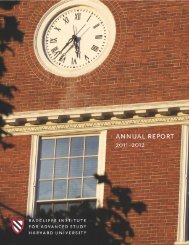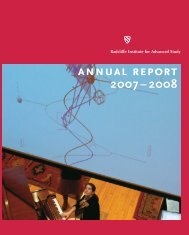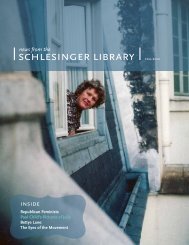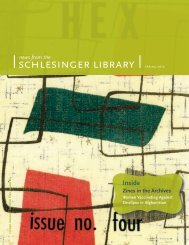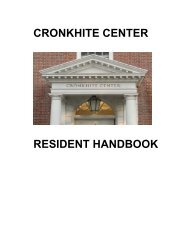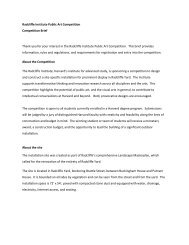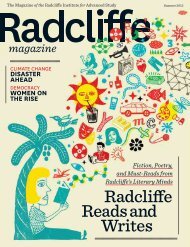The Schlesinger Library Documents Popular Culture - Radcliffe ...
The Schlesinger Library Documents Popular Culture - Radcliffe ...
The Schlesinger Library Documents Popular Culture - Radcliffe ...
You also want an ePaper? Increase the reach of your titles
YUMPU automatically turns print PDFs into web optimized ePapers that Google loves.
SNFALL2007.qxd 11/28/07 10:09 AM Page 1<br />
RADCLIFFE INSTITUTE FOR ADVANCED STUDY<br />
THE ARTHUR AND ELIZABETH SCHLESINGER LIBRARY ON THE HISTORY OF WOMEN IN AMERICA FALL 2007<br />
<strong>Schlesinger</strong> <strong>Library</strong><br />
news from the<br />
<strong>The</strong> cover of Ms. Marvel, volume 1<br />
Comics, Zines, and Graphic Narratives:<br />
<strong>The</strong> <strong>Schlesinger</strong> <strong>Library</strong> <strong>Documents</strong> <strong>Popular</strong> <strong>Culture</strong><br />
“If David Sedaris could draw, and if Bleak House<br />
had been a little funnier, you’d have Alison<br />
Bechdel’s Fun Home.” So says novelist Amy<br />
Bloom on the cover of one of the books to be<br />
discussed at a late-November event sponsored<br />
by the <strong>Schlesinger</strong> <strong>Library</strong>. Hillary Chute, a junior<br />
fellow in the Society of Fellows at Harvard, will<br />
talk about contemporary graphic narratives by<br />
women, focusing on two memoirs—Marjane<br />
Satrapi’s Persepolis: <strong>The</strong> Story of a Childhood<br />
(Pantheon, 2003), about growing up in Tehran in<br />
the 1980s, and Alison Bechdel’s Fun Home: A<br />
Family Tragicomic (Houghton Mifflin, 2006),<br />
about growing up gay in rural Pennsylvania with<br />
a closeted gay father. Both books are immensely<br />
popular among young readers.<br />
<strong>The</strong> library has a continuing commitment to<br />
promoting such conversations about popular culture<br />
and also to collecting materials about it. <strong>The</strong><br />
library’s executive director, Marilyn Dunn, says,<br />
“<strong>The</strong> <strong>Schlesinger</strong> <strong>Library</strong> collects popular culture<br />
because it both influences women and is<br />
influenced by women. <strong>The</strong> library also has a<br />
substantial collection of monographs analyzing<br />
and documenting the history of popular culture.<br />
By studying the library’s books, periodicals, and<br />
papers, one can chart popular culture for more<br />
than 200 years.”<br />
Marylène Altieri, the library’s curator of<br />
books and printed materials, points to the<br />
19th-century women’s magazine Godey’s<br />
Lady’s Book as an early example of popular<br />
culture in which women are depicted.<br />
Contemporary publications collected by the<br />
library include the mainstream Seventeen<br />
and Oprah as well as the niche periodicals<br />
Latina and Azizah: <strong>The</strong> Voice for Muslim<br />
Women and the comic book Ms. Marvel.<br />
But the edgiest publications at the<br />
<strong>Schlesinger</strong> may be its zines, small-circulation<br />
noncommercial publications such as<br />
Doris, published in Portland, Oregon, and<br />
Fuel, published by Harvard undergraduates.<br />
Altieri says some zines are periodicals and<br />
others are individually issued. “We collect<br />
women’s and girls’ zines because zines offer<br />
uncensored, frank, and creative views of their<br />
lives,” she says. She and several of her colleagues<br />
have formed a popular culture<br />
committee to locate and acquire zines and<br />
other nonmainstream materials. <strong>The</strong> sixmember<br />
committee assembled when the<br />
<strong>Schlesinger</strong> rewrote its collecting policies—<br />
as a result of the recently completed strategic<br />
plan—and decided to strengthen its collections<br />
in popular culture.<br />
continued on page 3
SNFALL2007.qxd 11/28/07 10:09 AM Page 2<br />
fall 2007<br />
Letter from the Director<br />
Growing Into the Strategic Plan<br />
I’m happy to report on the success of the first Summer<br />
Seminar on Gender History at the <strong>Schlesinger</strong> <strong>Library</strong>,<br />
which took place June 24–29. <strong>The</strong> attendance was<br />
terrific—a capacity crowd of 150—and both the panel<br />
presentations and the workshop discussion groups generated<br />
enthusiasm and praise. <strong>The</strong> conference title of,<br />
“Writing Past Lives: Biography as History,” brought out a<br />
varied crowd of participants, from settled academic historians<br />
turning to biography for the first time, to independent<br />
part-time avocational biographers who’d been<br />
tending a biographical labor of love for decades.<br />
<strong>The</strong> biographical subjects under discussion in the lectures<br />
offered by eminent historians over five mornings<br />
covered a wide range, including, among others, the 18thcentury<br />
ocean-crossers Benjamin Franklin and Elizabeth<br />
Marsh, the 19th-century political activists Amy Post,<br />
Sojourner Truth, and Elizabeth Cady Stanton, and the<br />
20th-century innovators Lillian Hellman, Dorothea Lange,<br />
Katherine Lumpkin, and Luisa Moreno.<br />
<strong>The</strong> 36 workshop participants who presented and discussed<br />
their research in small groups learned about an<br />
even more diverse cast of biographical characters. <strong>The</strong><br />
medical doctors Edith Banfield Jackson and Mary Putnam<br />
Jacobi; the fiction writers Kate Chopin and Dorothy West;<br />
the 19th-century women’s rights advocates Susan B.<br />
Anthony, Henry Blackwell, Lucretia Mott, and Emma<br />
Smith DeVoe; the civil rights pioneers Mary McCleod<br />
Bethune and Septima Clark; the bodybuilding enthusiast<br />
Charles Atlas; the 20th-century feminists and political<br />
reformers Bella Abzug, Crystal Eastman, and Gloria<br />
Steinem; a pair of nuns; a pair of teachers; and a transsexual<br />
activist were among their subjects.<br />
Participants’ comments on the week were heartily<br />
positive. It is very satisfying to read these typical comments<br />
in evaluations: “Workshops and discussions were<br />
extraordinarily helpful and exciting.” “This was an<br />
extraordinary week. Thank you! It was perhaps the best<br />
single educational experience I’ve ever had.” “Listening<br />
to others in the workshop taught me what works and<br />
what doesn’t.” “Hearing about other people’s work and<br />
their thoughts about my own really helped me see my<br />
subject in a new light.” “<strong>The</strong> seminar re-energized me<br />
and helped me think about how to move forward.” In<br />
answer to the question “What did you find most valuable<br />
and least valuable” one person wrote, “Oh dear, we<br />
have to choose I can’t. <strong>The</strong> package as a whole worked<br />
together for me. A good mix of listening, participating,<br />
and individual time with plenty of group interaction.”<br />
Evaluations like these mean that the 2007 Summer<br />
Seminar will not be the last! Plans are already in the<br />
making for a similar venture in late June 2008—but on a<br />
topic quite different from biography. More information<br />
should be available on the <strong>Schlesinger</strong> <strong>Library</strong> Web site<br />
by early 2008. Stay tuned!<br />
October 2, as all first Tuesdays of the month, was the day of another<br />
staff meeting. It was also a historic event because the addition of<br />
seven new staff members forced us out of our usual meeting place, the<br />
<strong>Radcliffe</strong> Room, and into a space large enough to accommodate us all.<br />
Similarly, finding suitable work space for our new colleagues was a<br />
challenge. With the assistance of <strong>Radcliffe</strong>’s executive dean, Louise<br />
Richardson, the <strong>Schlesinger</strong> has expanded into Putnam House—a<br />
small antique wooden building on the perimeter of <strong>Radcliffe</strong> Yard. This<br />
expansion allows us to welcome impressive new professional staff<br />
members, who will be instrumental in realizing the goals delineated in<br />
our strategic plan’s five initiatives.<br />
Drawing on the skills of our new digital librarian/archivist, Amy<br />
Benson, work on a project to digitize travel diaries with the British publisher<br />
Adam Matthew has begun. <strong>The</strong> travel diaries written by 19th-and<br />
20th century American women describe journeys across Africa, through<br />
Pakistan and China, all over Europe, and in fact on every continent—on<br />
foot, in trains, in “motor cars,” and by ship. We anticipate that within a<br />
year diaries and travel letters from approximately fifty of “our women”<br />
will be available for purchase in a digital collection titled, “Manuscript<br />
Travel Diaries and Letters from the <strong>Schlesinger</strong> <strong>Library</strong>, 1820–1960.”<br />
<strong>The</strong> initiative to eliminate our backlog of uncataloged materials<br />
began with the extensive papers of Anna Chennault, a Chinese<br />
American businesswoman and diplomat. <strong>The</strong> library’s new conservator,<br />
Amanda Hegarty, is assessing the condition of materials to be digitized.<br />
And happily, our effort to diversify has yielded gems. For<br />
instance, we are pleased to announce that Carmen Delgado Votaw, a<br />
founder of the National Organization for Women, has donated materials<br />
that include the National Conference of Latina Women.<br />
<strong>The</strong> travel diaries, written by 19th- and 20th-century<br />
American women, describe journeys across Africa,<br />
through Pakistan and China, all over Europe, and, in fact,<br />
on every continent.<br />
Activities sponsored by the <strong>Schlesinger</strong>, such as the upcoming program<br />
focusing on African American women’s health, “A Conversation with<br />
Byllye Avery and Judy Norsigian on Women and Health Care Reform,” will<br />
reinforce the message of our strategic plan that the <strong>Schlesinger</strong> <strong>Library</strong><br />
seeks to represent women of diverse backgrounds and viewpoints. To<br />
broadcast our message widely, the <strong>Radcliffe</strong> Institute’s communications<br />
office has already developed a comprehensive communications program,<br />
which includes the new look of this publication.<br />
— Marilyn Dunn<br />
Executive Director<br />
—Nancy F. Cott<br />
Carl and Lily Pforzheimer Foundation Director<br />
Jonathan Trumbull Professor of American History<br />
2
SNFALL2007.qxd 11/28/07 10:09 AM Page 3<br />
Documenting <strong>Popular</strong> <strong>Culture</strong><br />
Continued from page 1<br />
Among the books that Altieri purchases for the library are NASCAR<br />
romances, Christian romances, and fiction about women detectives. All<br />
of these genres are immensely popular, Altieri says, and provide windows<br />
into women’s lives.<br />
Pop culture comes in many varieties at the <strong>Schlesinger</strong>. <strong>The</strong> papers of<br />
Marjorie Henderson Buell document the birth of Little Lulu, the comicstrip<br />
heroine who rose to fame in the 1930s and appeared in newspapers<br />
throughout the 1950s. And the story of the most famous toy of the<br />
20th century, the Barbie doll, which Ruth Handler invented in 1959, can<br />
be gleaned from her papers at the library.<br />
Women’s music of the 1970s is documented in the papers of the singer,<br />
composer, and political activist Holly Near, who began performing at an<br />
early age and became an anti–Vietnam War activist in the 1970s. In 1975,<br />
Near became involved in the women’s music scene and performed around<br />
the United States and abroad. <strong>The</strong><br />
papers of the lesbian singer, songwriter,<br />
and activist Alix Dobkin are<br />
also housed at the library but have<br />
not yet been processed. Dobkin<br />
appeared regularly at the Michigan<br />
Womyn’s Music Festival<br />
(1976–1990) and at the West Coast<br />
Women’s Music and Comedy<br />
Festival (1984–1989).<br />
<strong>The</strong> records of organizations<br />
often shed light on the subcultures<br />
in which women participate. <strong>The</strong><br />
Moving Violations Motorcycle Club<br />
was founded in 1985 by a small<br />
group of Boston-area women who<br />
enjoyed riding together and sharing<br />
information about motorcycling.<br />
<strong>The</strong> group donated its papers to the library in 2001.<br />
Harvard undergraduates appreciate the pop culture gems at the<br />
<strong>Schlesinger</strong>. Janine Mandel ’07, for example, used her Carol K.<br />
Pforzheimer Fellowship to write her honors thesis in the history department,<br />
“‘Remember the Wonder’: Wonder Bread and American Society,<br />
1921–2007.” Mandel relied on the library’s archival holdings, including<br />
“<strong>The</strong> Art of Serving Bread,” a recipe pamphlet published in 1935 promoting<br />
the use of Taystee Bread<br />
One way Harvard students learn about the library’s popular culture riches<br />
is through classes that visit the library. In the fall of 2006, reference<br />
librarian Sarah Hutcheon provided an introduction to <strong>Schlesinger</strong> materials<br />
for students taking the course Body Sculpting in Modern America, offered<br />
by the Committee on Degrees in Studies of Women, Gender, and Sexuality.<br />
Among the library materials Hutcheon showed the class was the periodical<br />
Transgender Tapestry and the book Bodysculpture: Weight Training for<br />
Women by Valerie and Ralph Carnes (Simon and Schuster, 1978).<br />
It’s no surprise that many of the <strong>Schlesinger</strong>’s librarians are themselves<br />
experts in popular culture. Marilyn Morgan, a manuscript cataloger at the<br />
library, for example, serves on the board of the Journal of <strong>Popular</strong> <strong>Culture</strong>.<br />
Clearly, for anyone wanting to explore the history of women in popular<br />
culture, the <strong>Schlesinger</strong> <strong>Library</strong> is a must-visit.<br />
— Pat Harrison<br />
Publications Manager<br />
Fall Events at the <strong>Schlesinger</strong> <strong>Library</strong><br />
Visit www.radcliffe.edu/events/calendar.php for the most up-to-date<br />
information.<br />
wednesday, october 3, 2007<br />
Movie Night: Curly Top (1935), starring Shirley Temple<br />
A discussion with Gerald Peary, a film critic for the Boston Phoenix,<br />
followed the film.<br />
tuesday, october 9, 2007<br />
Panel Discussion: “Dining Diplomacy: Japanese Cuisine and<br />
American Taste”<br />
Cosponsored by the <strong>Schlesinger</strong> <strong>Library</strong> and the Consulate-General<br />
of Japan in Boston<br />
thursday, october 18, 2007<br />
Boston Seminar on the History of Women and Gender<br />
“A Sporting Chance: Billie Jean King, Title IX, and the Revolution in<br />
Women’s Sports”<br />
Susan Ware, independent scholar<br />
Comment: Eileen McDonagh, Northeastern University and Institute<br />
for Quantitative Social Science, Harvard University<br />
wednesday, november 7, 2007<br />
Movie Night: Times Square (1980), directed by Allan Moyle<br />
A discussion with Peg Aloi, adjunct professor of film studies at<br />
Emerson College and a film critic for the Boston Phoenix, followed<br />
the film.<br />
thursday, november 15, 2007<br />
“A Conversation with Byllye Avery and Judy Norsigian on Women and<br />
Health Care Reform”<br />
Byllye Avery, founder of Black Women’s Health Imperative<br />
Judy Norsigian, executive director and coauthor of Our Bodies,<br />
Ourselves<br />
Kip Tiernan, founder of Rosie’s Place<br />
thursday, november 29, 2007<br />
Lecture: “Out of the Gutter: Contemporary Graphic Novels by<br />
Women”<br />
Hillary Chute, Harvard University Society of Fellows<br />
Chute’s talk will focus on two recent memoirs—Marjane Satrapi’s<br />
Persepolis, about growing up in Tehran in the 1980s, and Alison<br />
Bechdel’s Fun Home, about growing up gay in rural Pennsylvania<br />
with a closeted gay father—that have brought critical acclaim to<br />
women’s nonfiction comics. Chute will examine the success of these<br />
books and address the question “Why comics”<br />
5 PM, <strong>Radcliffe</strong> Gymnasium<br />
wednesday, december 5, 2007<br />
Movie Night: Beyond Imagining: Margaret Anderson and the Little<br />
Review (1994), directed by Wendy Weinberg, and Frances Steloff:<br />
Memoirs of a Bookseller (1987), directed by Deborah Dickson,<br />
two documentary shorts about literary women<br />
A discussion with Hannah Sullivan, PhD candidate, department of<br />
English and American literature and language, Harvard University, will<br />
follow the films.<br />
6 PM, <strong>Radcliffe</strong> Room, <strong>Schlesinger</strong> <strong>Library</strong><br />
thursday, december 6, 2007<br />
Exhibit Reception: Little Lulu Lives at the <strong>Schlesinger</strong> <strong>Library</strong>: <strong>The</strong><br />
Marjorie Henderson Buell Collection<br />
This exhibit, which runs until March 28, features a selection of<br />
images and memorabilia from the papers of Marjorie Henderson<br />
Buell, creator of the mischievous comic strip heroine Little Lulu and<br />
the first woman cartoonist to achieve international fame.<br />
4 PM, <strong>Radcliffe</strong> Room, <strong>Schlesinger</strong> <strong>Library</strong><br />
thursday, december 13, 2007<br />
Boston Seminar on the History of Women and Gender<br />
“Last Man to Die: Vietnam and the Soldier as Citizen”<br />
Robert Self RI ’08, Brown University<br />
Comment: Dayo F. Gore, University of Massachusetts at Amherst<br />
5:15 PM, Massachusetts Historical Society, Seminar Room<br />
1154 Boylston Street, Boston<br />
3
SNFALL2007.qxd 11/28/07 10:09 AM Page 4<br />
Reading Into Etiquette: Ann Page Stecker<br />
“Apart from other considerations, the demeanour of a young man<br />
when playing cards affords a very good test of his manners.”<br />
—From Manners for Men by Mrs. Humphry (James Bowden, 1897)<br />
“Sweetness is to woman what sugar is to fruit. It is her first<br />
business to be happy—a sunbeam in the house, making<br />
others happy.”<br />
—From Manners Makyth Man by the author of How to Be Happy Though<br />
Married (Charles Scribner’s Sons, 1887)<br />
While on sabbatical in the fall of 2005, Ann<br />
Page Stecker, a historian and humanities<br />
professor at Colby-Sawyer College, decided<br />
4that she wanted to read every etiquette<br />
book written by a woman from the 1850s to<br />
the present. She came directly to the<br />
library. “Of course,” she says, “everything<br />
was there.”<br />
<strong>The</strong> etiquette collection at the library<br />
was built on a core collection of books<br />
donated by Arthur Meier <strong>Schlesinger</strong>, Sr.—<br />
author of the important history of etiquette<br />
Learning How to Behave: A Historical Study<br />
of American Etiquette Books (1946)—and<br />
his wife, Elizabeth Bancroft <strong>Schlesinger</strong>.<br />
<strong>The</strong> collection documents the ways women<br />
were expected to act and be treated in the<br />
social sphere over generations. <strong>The</strong> library<br />
has continued to collect etiquette books,<br />
for men and children as well as for women,<br />
acquiring older titles from the 19th and<br />
20th centuries and seeking out current<br />
publications that document behavioral<br />
expectations and social aspirations.<br />
Stecker’s relationship with the<br />
<strong>Schlesinger</strong>—and her fascination with the<br />
etiquette, advice, and conduct genre—<br />
dates back to the 1990s. She and a friend,<br />
Nancy Coffey Heffernan, discovered a trove<br />
of letters that three sisters and a brother<br />
wrote to their father, James Wilson, after he<br />
had gone west to join the Gold Rush.<br />
Stecker did some of the research for Sisters<br />
of Fortune (University Press of New<br />
England, 1993), about the letters of the<br />
Wilson family, at the <strong>Schlesinger</strong>. She was<br />
particularly intrigued by one of the sisters,<br />
Mary Elizabeth (Lizzie) Wilson Sherwood,<br />
an understudied—and underestimated—<br />
writer and tastemaker.<br />
Sherwood’s most popular book was<br />
Manners and Social Usages (1884). Highly<br />
influential, the book went into 14 editions<br />
and was still being printed after her death<br />
in 1903. <strong>Schlesinger</strong> would later praise it<br />
in Learning How to Behave. Sherwood’s<br />
other books included <strong>The</strong> Art of Entertaining<br />
and <strong>The</strong> Amenities of Home. “She<br />
wrote 11 books in all,” says Stecker, “plus<br />
three novels, a collection of poetry, and literally<br />
thousands of articles in the New<br />
York Times and other literary journals of<br />
the day.” Sherwood traveled across<br />
Europe and met Queen Victoria. And yet,<br />
this very accomplished woman is practically<br />
unknown outside etiquette circles. In<br />
fact, both the biography and the obituary of<br />
another arbiter of etiquette, Emily Post,<br />
make it clear that Sherwood was not taken<br />
seriously. “I wanted to figure out why she<br />
seemed to be trivialized,” says Stecker, “if<br />
she was writing the book that everyone<br />
was reading.”<br />
So Stecker returned to the <strong>Schlesinger</strong><br />
this past summer as a research support<br />
grant recipient, this time to read the approximately<br />
2,500 letters in the Judith Martin<br />
collection. To Stecker, Martin–aka Miss<br />
Manners–“philosophizes about manners” in<br />
the way Sherwood did. “I wanted to read<br />
the other side of the conversation,” she<br />
says. “What do people write to the Lizzie<br />
Sherwoods and Judith Martins of the<br />
world”<br />
As it turns out, the letters to both etiquette<br />
writers are more alike than the generations<br />
elapsed would suggest. Stecker<br />
believes this may be because we are living<br />
through another great time of change,<br />
both in manners and in access to power.<br />
It’s a connection she’ll be exploring in the<br />
biography—a biography she wasn’t sure<br />
she would write.<br />
Stecker credits the <strong>Schlesinger</strong> with<br />
helping to advance her scholarship. “If<br />
scholarship doesn’t move from one scholar<br />
to another, it’s dead,” she says. “<strong>The</strong><br />
hospitality of the <strong>Schlesinger</strong> is just<br />
amazing.”<br />
—Ivelisse Estrada<br />
Writer/Editor<br />
Giving Back to the <strong>Library</strong><br />
An odd coincidence further entwines<br />
Ann Page Stecker and the <strong>Schlesinger</strong><br />
<strong>Library</strong>. Upon reading about the recently<br />
acquired Gretchen Schuyler collection<br />
in the Spring 2006 issue of this<br />
newsletter, Stecker realized that she<br />
had documents and artifacts, acquired<br />
through a colleague, to augment the<br />
collection. After consulting with<br />
Schuyler’s niece, Stecker delivered the<br />
items to the library. “It was wonderful<br />
to give something back,” she says.<br />
Thanks to Stecker’s own scholarly hospitality,<br />
the Gretchen Schuyler collection<br />
now contains additional journals, a<br />
medal, and a signed letter from<br />
President Truman.<br />
4
SNFALL2007.qxd 11/28/07 10:09 AM Page 5<br />
Rosa L. Parks<br />
Florence Edmonds, the mother of Ruth Edmonds Hill<br />
Taking Part in History<br />
<strong>The</strong> <strong>Schlesinger</strong> <strong>Library</strong> Continues Its Commitment to Documenting the Histories<br />
of African American Women<br />
As part of its new strategic plan, the <strong>Schlesinger</strong> <strong>Library</strong> is working<br />
to strengthen its collections on African American women and<br />
others whose histories are not well documented. But this is not a<br />
new area of emphasis for the library. In the mid-1970s, the<br />
<strong>Schlesinger</strong> launched one of the largest oral history projects ever<br />
undertaken in the United States, the Black Women Oral History<br />
Project, which led to other oral history projects and continues to<br />
be a major resource for scholars and students.<br />
Ruth Hill, who coordinated the Black Women Oral History<br />
Project, tells an illuminating story about Rosa L. Parks, the African<br />
American women whose actions triggered the 1955 Montgomery<br />
bus boycott. “We all have this idea of a tired woman who just<br />
wasn’t going to move, but there’s much more to story,” Hill says.<br />
As readers of Parks’s oral history can learn, she had received training<br />
in social organizing at the Highlander Center in Tennessee.<br />
This detail is just one example of the vital information available<br />
in the 10-volume set of oral histories with 72 African<br />
American women that the library obtained between 1977 and<br />
1981. Some of the women are well known—like Parks and Harlem<br />
Renaissance writer Dorothy West—but most were known only in<br />
their local communities. An advisory committee selected the<br />
women to be interviewed.<br />
Hill tells about recommending that the project interview Florence<br />
Edmonds (1890–1983), a public health nurse and administrator in<br />
Pittsfield, Massachusetts. “<strong>The</strong> committee said yes, let’s include her,<br />
and then somebody asked me if that was my mother,” Hill says,<br />
laughing. “I didn’t want to say until they made their decision.”<br />
Hill was with the Black Women Oral History Project from the<br />
beginning, having been hired in 1977 to coordinate it. “<strong>The</strong> project<br />
changed a lot of attitudes,” she says. “<strong>The</strong> library was no longer<br />
just dealing with white, Anglo-Saxon, Protestant women. People<br />
began to see that there was something more than what they had<br />
been collecting in the past.”<br />
<strong>The</strong> library had acquired the papers of Charlotte Hawkins<br />
Brown, an African American educator, in 1964, but it wasn’t until<br />
1970 that the papers of Pauli Murray were acquired and 1985 that<br />
Dorothy West’s papers came to the library. “<strong>The</strong> African American<br />
community began to realize that this was a good place to put<br />
their materials,” says Hill. “<strong>The</strong>y knew their papers would be<br />
taken care of.”<br />
An important component of the project from the very beginning<br />
was to share the transcripts with other institutions, including<br />
Atlanta University, Columbia University, the University of California<br />
at Berkeley, and the New York Public <strong>Library</strong>. “When we first<br />
started the project, Berkeley and Columbia were the main places<br />
doing oral history,” Hill says. “But now everybody all over the<br />
world is doing it.”<br />
“<strong>The</strong> African American community began to realize<br />
that this was a good place to put their materials,” says<br />
Hill. “<strong>The</strong>y knew their papers would be taken care of.”<br />
Other oral history projects followed at the <strong>Schlesinger</strong> <strong>Library</strong>,<br />
including projects with Cambodian and Chinese women and with<br />
the founders of the National Organization for Women. Hill is enthusiastic<br />
about the library’s new initiative to further strengthen its collections<br />
on African American women. “Progress has been made in<br />
this area,” she says, “but there’s still more to do.” Asked what the<br />
highlight of the Black Women Oral History Project was for her, Hill<br />
says, “<strong>The</strong> fact that the library would commit itself to doing this<br />
when they didn’t have to. <strong>The</strong>y saw it was a wonderful opportunity<br />
for other people to be part of history.”<br />
—Pat Harrison<br />
Publications Manager<br />
CREDITS<br />
Image on front cover is & ©2006 Marvel Character Inc. All rights reserved. Magazine image on page 3 is from the <strong>Schlesinger</strong> <strong>Library</strong> collection. Book cover on page 4 is from<br />
the library’s etiquette collection. Photos on page 5, by Judith Sedwick, are owned by the <strong>Radcliffe</strong> Institute and preserved by the <strong>Schlesinger</strong> <strong>Library</strong>. Photo on page 6 is from the<br />
papers of June Jordan, <strong>Schlesinger</strong> <strong>Library</strong>. Photo on back cover is from the papers of Ruth Handler.<br />
5
SNFALL2007.qxd 11/28/07 10:09 AM Page 6<br />
In and Out of the Pipeline:<br />
Newly Acquired and Newly Processed Collections<br />
New manuscript collections arrive at the library almost daily.<br />
When several collections arrive at the same time, an obstacle<br />
course of cartons springs up, only to be dispersed as each<br />
begins its journey into the manuscript pipeline. Here is a sampling<br />
of these new acquisitions.<br />
<strong>The</strong> oldest new acquisitions include a 1764 manuscript cookbook<br />
donated by Helen Cutter Maclennan ’57 and the 1869<br />
diary of an anonymous Vermont woman. <strong>The</strong> newest include<br />
the diaries (1993–2006) of author Charlotte Salisbury and the<br />
diaries (1973–2007) of author, professor, and MacArthur fellow<br />
Laura Otis.<br />
New feminist collections include those of Carmen Delgado<br />
Votaw, a leader in the National Conference of Puerto Rican<br />
Women and the National Organization for Women; Bobbi<br />
Ausubel, former codirector of the experimental Caravan<br />
<strong>The</strong>ater; and the Veteran Feminists of America, a<br />
nonprofit organization for veterans of the second wave of the<br />
feminist movement.<br />
Other new acquisitions document women’s activism of all kinds.<br />
Among these are the papers of Ellyn Polshek, who was active in<br />
the Women’s Strike for Peace, and Roberta Kalechofsky, who<br />
founded Micah Publications, specializing in animal rights and<br />
vegetarian literature, and Jews for Animal Rights.<br />
Personal papers offer a window into daily life. <strong>The</strong> papers of<br />
socialite Lila Hotz Luce Tyng (1899–1999) chronicle the life of<br />
the first wife of publisher Henry Luce. <strong>The</strong> papers of Jean Wade<br />
Rindlaub, one of the most influential women in advertising,<br />
include information on ad campaigns to sell housewives<br />
everything from soup to soap.<br />
Other collections document important eras in history and<br />
changes in culture. A pilot, cartographer, and career officer for<br />
the Central Intelligence Agency from 1948 to 1966, Margaret<br />
Mace Kingsman became a target of Senator Joseph McCarthy<br />
and the House Un-American Activities Committee because of<br />
her trips abroad in the company of Margaret Sanger, John<br />
Reed, and H. G. Wells. Sociologist and psychoanalyst Nancy<br />
Chodorow ’65, RI ’02 donated interviews that she conducted as<br />
part of a project on early women in the field of psychotherapy.<br />
<strong>The</strong> newly processed collections, which represent the other end of<br />
the manuscript pipeline, are equally varied and interesting. <strong>The</strong>ir<br />
finding aids are available at http://oasis.lib.harvard.edu/<br />
oasis and are searchable from anywhere in the world.<br />
<strong>The</strong> largest of the newly processed collections are of two major<br />
contemporary writers: radical feminist Andrea Dworkin, whose<br />
campaign against pornography sparked a nationwide debate,<br />
and June Jordan, featured in the spring newsletter.<br />
Several other newly processed collections also focus on the first<br />
and second waves of the women’s movement: the papers of<br />
Doris Stevens, suffragist and international women’s rights advocate,<br />
are rich with material on the National Woman’s Party and<br />
the Inter-American Commission of Women; Hope Hale Davis’s<br />
papers document her long life as a writer, feminist, onetime<br />
Communist, and teacher; and the records of the Tully-Crenshaw<br />
Feminist Oral History Project include interviews conducted by<br />
and with past officers and members of the National<br />
Organization for Women regarding the formation of NOW.<br />
<strong>The</strong> American Red Cross Clubmobile Service records are replete<br />
with correspondence, journals, photographs, clippings, and artifacts<br />
that document the work of more than 1,000 American<br />
women who served coffee and doughnuts from “clubmobiles” to<br />
American servicemen in England and Europe during World War II.<br />
Two collections, the papers of Mary Peabody and Marietta Tree,<br />
document two generations of women in the Peabody family of<br />
Massachusetts. At the age of 72, Mary Peabody became active<br />
in the civil rights movement and was briefly jailed, an incident<br />
that garnered attention because her son, Endicott, was governor<br />
of Massachusetts. Her daughter, Marietta Tree, was active in<br />
Democratic politics and worked for human rights. Her State<br />
Department–sponsored fact-finding tour of Asia in 1966 focused<br />
on human rights and the status of women.<br />
—Kathryn Allamong Jacob<br />
Johanna-Maria Fraenkel Curator of Manuscripts<br />
June Jordan in her study, from one of the largest newly processed collections<br />
6
SNFALL2007.qxd 11/28/07 10:09 AM Page 7<br />
<strong>Schlesinger</strong> <strong>Library</strong> Research Grants 2007<br />
CAROL K. PFORZHEIMER STUDENT<br />
FELLOWSHIPS<br />
Tatiana Chaterji ’08<br />
“Citizenship Across Status: Civic Space,<br />
Community Action, and Feminism in Boston’s<br />
Haitian Community”<br />
Frederic Clark ’08<br />
“Indigenous Identity in the Ancient World:<br />
<strong>The</strong>resa Goell and Changing Perceptions of<br />
Near Eastern <strong>Culture</strong>”<br />
Marta Maria Figlerowicz ’09<br />
“Interpreting Past Portrayals of the Female<br />
Body: Hélène Cixous and the Song of Songs”<br />
Tyler Beck Goodspeed ’08<br />
“Unequal Equilibrium: Women in Economics,<br />
1900–1940”<br />
Ann Kathleen Heffernan ’08<br />
“Born Too Soon: Constructing Parenthood in<br />
the Neonatal Intensive Care Unit”<br />
Catherine Jampel ’08<br />
“Art With Words: Sister Corita Kent and the<br />
Meaning of Letters in American Protest Art,<br />
1960 to 1986”<br />
Maggie Klein ’08<br />
“Helping Ourselves, Crafting Ourselves: An<br />
Ethnographic Inquiry into Self-Help Books”<br />
Eric Lee ’08<br />
“Abolitionism, Abortion, and Dog Whistle<br />
Politics: <strong>The</strong> Right’s Pro-Life Effort to Link Dred<br />
Scott to Roe”<br />
Jenna Marie Mellor ’08<br />
“<strong>The</strong> Politics of ‘Woman’: Reproduction,<br />
Womanhood, and Involuntary Sterilization”<br />
Robert Raviv Murciano-Goroff ’09<br />
“Dr. Martha Eliot’s Leadership of the Post-<br />
WWII ‘Conscience of the American People’ and<br />
Public Health Diplomacy”<br />
Sopen B. Shah ’08<br />
“Gender on the Campaign Trail: How Male<br />
Candidates Ran Against Female Opponents in<br />
Senatorial Campaigns from 1982 to 2002”<br />
Daniel Shalev ’08<br />
“AIDS Discourse: Resistant Narrative and<br />
Community Activism”<br />
Justine Shapiro-Kline ’08<br />
“<strong>The</strong> Art of Writing Food: M.F.K. Fisher, Julia<br />
Child, and the Introduction of French Food in<br />
America”<br />
Abigail Wright ’08<br />
“Alice Hamilton and the Changing Face of<br />
Industrial Toxicology”<br />
RESEARCH SUPPORT GRANTS<br />
C. Dianne Creagh<br />
Stony Brook University<br />
“Benevolent Leverage: Substitute Mothers and<br />
Autonomy in New York’s Catholic and Jewish<br />
Communities”; “Adoptable Jewish Children and<br />
the Shifting Legacy of Louise Wise”<br />
Sara Dubow<br />
Hunter College, City University of New York<br />
“Ourselves Unborn: Fetal Meanings in Modern<br />
America”<br />
Megan Elias<br />
Queensborough Community College, City<br />
University of New York<br />
“Cooking the Books: Nationalism, Regionalism,<br />
and American Cookbooks, 1865–1917”<br />
Alice Fahs<br />
University of California<br />
“Newspaper Women and the Making of the<br />
Modern, 1885–1918”<br />
Stephanie Gilmore<br />
University of Connecticut<br />
“Groundswell: Grassroots Feminist Activism in<br />
Postwar America”<br />
Janet Golden<br />
Rutgers University<br />
“American Babies: A Modern History”<br />
Judith A. Houck<br />
University of Wisconsin, Madison<br />
“Claiming Our Bodies, Demanding Our Liberation:<br />
<strong>The</strong> Women’s Health Movement, 1969–1991”<br />
Melissa R. Klapper<br />
Rowan University<br />
“Ballots, Babies, and Banners of Peace: American<br />
Jewish Women’s Pre–World War II Activism”<br />
Heather Murray<br />
University of Ottawa<br />
Project 1, “Not in This Family: Gays, Lesbians, and<br />
the Family of Origin in North America, 1945–90s<br />
Project 2, “Lesbian <strong>The</strong>rapeutic <strong>Culture</strong>s of the<br />
1970s”<br />
Jeanne Schinto<br />
Independent writer<br />
“Miss Edgerton’s Ye Colonial Shoppe: Women in<br />
the Antiques Business During the Early Years of<br />
the Trade”<br />
Ann Page Stecker<br />
Colby-Sawyer College<br />
“Biography of Mary Elizabeth Wilson Sherwood”<br />
Amy B. Trubek<br />
University of Vermont<br />
“On Cooking: Investigating the Link Between Food<br />
<strong>Culture</strong> and Health, 1950 to Today”<br />
Lara Vapnek<br />
St. John’s University<br />
“Mary Putnam Jacobi and the Meanings of<br />
Independence”<br />
Kimberly Wilmot Voss<br />
Southern Illinois University, Edwardsville<br />
“Catherine East: Midwife of the Feminist<br />
Movement”<br />
DISSERTATION SUPPORT GRANTS<br />
Margo Beggs<br />
University of Toronto<br />
“Harriet Hosmer (1830–1908): Fame, Photography<br />
and the ‘American Sculptress’”<br />
Michelle Branch<br />
University of California at Berkeley<br />
“Food, Taste and Cultural Power: Alimentary<br />
Discourses and Practices in the Nineteenth-<br />
Century Urban North”<br />
Deirdre Clemente<br />
Carnegie Mellon University<br />
“Style and Seven Sisters: <strong>Radcliffe</strong> as the Impetus<br />
for Women’s Fashions, 1900–1960”<br />
Nicole Eaton<br />
Brown University<br />
“Women’s History and Women’s Rights: Gender<br />
and Collective Memory in American Feminism,<br />
1848–1998”<br />
Jessica L. Foley<br />
Brown University<br />
“Youth, Gender, and Feminism: Girlhood Between<br />
1945 and 1975”<br />
Katja Guenther<br />
Harvard University<br />
“<strong>The</strong> Transformation of the Body Schema—Paul<br />
Schilder, Somatic Psychiatry, and the<br />
Psychoanalytic Movement 1914–1940”<br />
Benjamin Koch<br />
University of Texas at Austin<br />
“<strong>The</strong> Impeachment Inquiry of Richard Nixon”<br />
Alison Lefkovitz<br />
University of Chicago<br />
“<strong>The</strong> Politics of Marriage in the Era of Women’s<br />
Liberation”<br />
Annelise K. Madsen<br />
Stanford University<br />
“Allegory as Gender Politics: Suffrage<br />
Performance, Modern Womanhood, and the Garb<br />
of Tradition”<br />
Paige L. Meltzer<br />
Brown University<br />
“Maternal Citizens: Gender and Women’s Activism<br />
in the United States, 1945–1960”<br />
Stacie Taranto<br />
Brown University<br />
“<strong>The</strong> Conservative Family Values Movement in New<br />
York State, 1970–1992”<br />
Megan Threlkeld<br />
University of Iowa<br />
“‘Woman’s Challenge to the World’: US Women’s<br />
Internationalism and US–Mexican Relations,<br />
1916–1939”<br />
Emily Thuma<br />
New York University<br />
“‘Violence Against Women’ and the Politics of<br />
Imprisonment: Feminist Citizenship, Race, and the<br />
State, 1968–2004”<br />
Neici M. Zeller<br />
University of Illinois at Chicago<br />
“Feminist Agendas in a Transnational Context:<br />
Collaborations Between United States and<br />
Caribbean Women’s Groups on Social Policies<br />
(1930–1960)”<br />
7
SNFALL2007.qxd 11/28/07 10:09 AM Page 8<br />
fall 2007<br />
A detail from one of Sarah Bryant Fay’s circular letters, this one from her travels in Florida. <strong>The</strong> <strong>Schlesinger</strong> <strong>Library</strong> has launched<br />
an initiative to digitize manuscript materials such as this one for worldwide availability.<br />
News from the <strong>Schlesinger</strong> <strong>Library</strong><br />
is published twice a year to inform<br />
those interested in the library about<br />
recent acquisitions, special projects,<br />
and the programs offered by the<br />
<strong>Radcliffe</strong> Institute’s research library<br />
on the history of women in the<br />
United States. <strong>The</strong> newsletter is<br />
written and edited by members of<br />
the <strong>Radcliffe</strong> Institute staff.<br />
<strong>The</strong> Arthur and Elizabeth<br />
<strong>Schlesinger</strong> <strong>Library</strong> on the<br />
History of Women in America<br />
<strong>Radcliffe</strong> Institute<br />
for Advanced Study<br />
Harvard University<br />
10 Garden Street<br />
Cambridge, Massachusetts 02138<br />
Telephone: 617-495-8647<br />
Fax: 617-496-8340<br />
Email: slref@radcliffe.edu<br />
www.radcliffe.edu/schles<br />
Copyright © 2007 by the President<br />
and Fellows of Harvard College.<br />
<strong>The</strong> Arthur and Elizabeth <strong>Schlesinger</strong> <strong>Library</strong><br />
<strong>Radcliffe</strong> Institute for Advanced Study<br />
Harvard University<br />
10 Garden Street<br />
Cambridge, Massachusetts 02138<br />
In This Issue<br />
<strong>The</strong> <strong>Schlesinger</strong> <strong>Library</strong> <strong>Documents</strong><br />
<strong>Popular</strong> <strong>Culture</strong><br />
PAGE 1<br />
Taking Part in History: <strong>The</strong> <strong>Schlesinger</strong><br />
<strong>Library</strong> Continues Its Commitment to<br />
Documenting the Histories of African<br />
American Women<br />
PAGE 5<br />
Newly Aquired and Newly Processed<br />
Collections<br />
PAGE 6<br />
non-profit org<br />
us postage<br />
p a i d<br />
p e r m i t # 3 7 5<br />
n a s h u a n h



